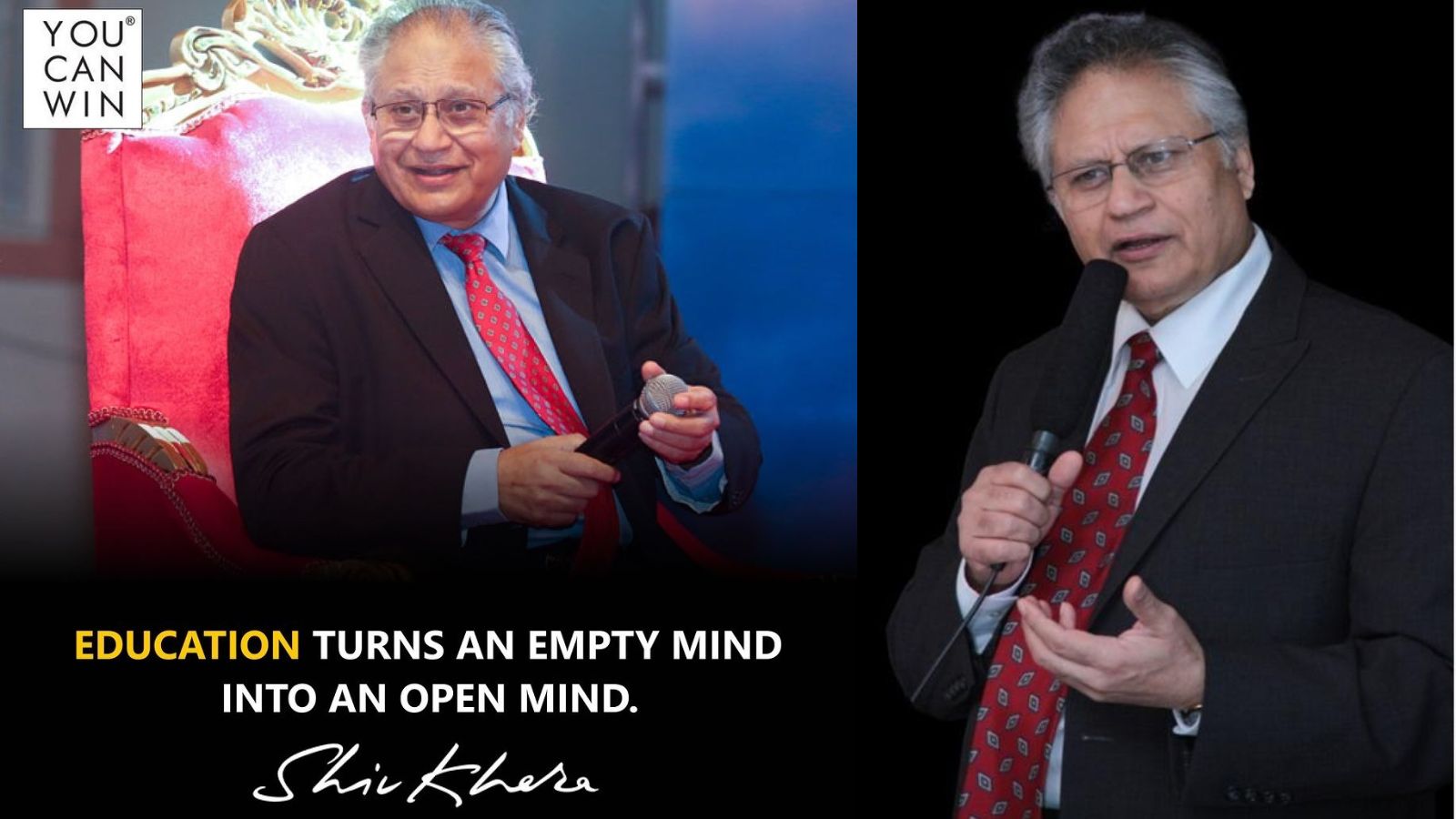Author, motivational speaker, and business consultant Shiv Khera is best known for his self-help book titled You Can Win, a bestseller, which has been translated into 17 languages and inspired many people over the years with its motivational and inspirational content.
He has written 16 books that have sold over nine million copies. He has also given keynote addresses in 17 countries and attended over 1,000 conferences.
Khera’s work focuses on personal development, leadership, and success principles. His books and seminars aim to empower individuals to achieve their goals and lead fulfilling lives.
Patriot interacted with Khera to know more about his perspectives:
Q. How has the journey been so far? How do you feel about it?
A. The journey has been a roller-coaster ride. Lots of lessons have been learnt. Since life does not have a rewind button, there are no regrets either. I feel fortunate to be where I am, personally, professionally and socially.
Q: When you wrote the book You Can Win, motivational speaking as a profession was just emergning. Today we see a lot of people giving motivational speeches and writing books. How do you see this phenomenon?
A. When I wrote my book You Can Win, there were already many self-help books and motivational speakers in the market. However, today, many more new books and speakers have emerged though very few of them are genuine and authentic. I would say many pretentious people have come into the profession, only to make a quick buck. Many of them lack integrity.
Q. How does Shiv Khera define success?
A. Success, in my opinion, is a matter of choice, and not chance. A series of positive choices in life is what I call success and a series of negative choices failure. Have you ever wondered why some people, no matter what they do, always succeed whereas others fail? The answer is simple.
If you read the life histories of successful people, you will find there are certain behavioural patterns common in all of them. If we adopt their attributes, we shall be successful.
Similarly, there are certain common characteristics in all failures. If we avoid them, we shall not fail. No wonder Socrates said success is a habit, and so is failure.
We frequently portray success as merely the result of chance or luck – a notion where people happen upon prosperity without purposeful effort. However, I firmly disagree with this notion.
I firmly assert that success is the result of intentional decisions and actions.
I believe that our mindset has a big impact on how successful we are. This is not something that is predetermined or out of our control; rather, it is a decision that we consciously make. Anyone can succeed if they adopt a confident and determined attitude.
Q. What measures can be taken to support individuals grappling with mental health problems, and what is your perspective on this matter?
A.First and foremost, awareness is critical. We must remove the stigma associated with mental health. Seeking help is not a sign of weakness; it is a sign of courage. Let us encourage open dialogue and education about mental health.
Second, we require effective mental health services. Make counselling and therapy more affordable. It is critical that those in need have unrestricted access to professional assistance.
Third, we must make well-being a priority in both our work-places and schools. Our curriculum and corporate culture ought to include mental health. People who are content and healthy work harder.
Finally, self-care is essential. People should be urged to treat their mental health just as seriously as their physical health. Everyday activities should include exercise, mindfulness, and stress reduction.
Q. What advice would you like to offer to the current generation, especially when it comes to mental health?
A. Whatever society or your own mind may tell you, your mental health should never be ignored.
Never undervalue the importance of honest communication. If you’re struggling, speak up. Sharing your feelings is a sign of strength, not weakness, whether you are talking to a friend, a member of your family, or a professional.
Keep in mind that self-care is not selfishness; it is necessary. Give yourself some time alone. Find your source of peace, whether it is reading a book, running, or just taking deep breaths. Give your mental health the same priority you give your physical health.
And now for the big one: remove the stigma. It is acceptable to occasionally not feel okay since mental health challenges are more common than you might think. Just like you would for any physical ailment, ask for assistance when you need it.
Be resilient, and that is it. Life can throw at you some curveballs, but what makes you are your abilities to recover from them. Have faith in your ability to overcome challenges.
Q. Your audience comes from varied backgrounds. How can one approach motivational speeches/writings to ensure that it targets people from all backgrounds?
A. With the advancement of technology today, all information is available for free. It is up to the individual to reach out with a burning desire to learn. Hence, it is not the privilege of the few.
Q. Do you think a person’s economic/social background could hinder their way to success? How can we as a society address it?
A. The road to success should never be impeded by one’s social or economic circumstances. The reality, though, is that they can pose serious problems.
A person’s potential should never be assessed based on the size of their bank account or social standing. No matter what their background, everyone should have the same chance to succeed.
We can confront this problem head-on as a society. We must first make investments in education. All people should be able to obtain high-quality education; it should not be reserved for a select few. The playing field can be levelled by using scholarships, mentoring programmes, and vocational training.
Let us also foster entrepreneurship; encourage and assist people from all backgrounds in starting their own businesses. Programmes like micro-loans and business incubators can empower aspiring entrepreneurs.
Lastly, let’s change the narrative. Confront prejudices and stereotypes that support inequality. Celebrate the accomplishments of people from various backgrounds to motivate others.
It is time for us as a society to take action. Never should someone’s social or economic situation stand in the way of their success. We can all work together to make the world fairer and more welcoming so that everyone has a chance of realising their aspirations.
Q. Today, the nation grapples with the issue of communal tensions. Reports of lynchings and hate crimes are routine. What are your thoughts on this matter?
A. I disagree; it is not only our nation but the world that is grappling with communal tension. Just look at France, Sweden, Burma, and the Middle East. Hate crime has been going on for thousands of years. So, if people from any one religion consider themselves to be superior and forcibly want to convert others, there is bound to be resistance. To have harmony, we need to learn mutual respect and to have the same set of rules on all sides.
Q. When individuals encounter a series of failures in life, they often contemplate giving up and their resilience wanes. What message do you wish to convey to them?
A. Failure is not the end; it is merely a stepping stone to success. Keep this in mind when setbacks pile up and spirits begin to wane.
I have said it before, and I will say it again: success is a choice, not a lottery. Those who have achieved great success have had their fair share of setbacks. These setbacks, however, are not obstacles; they are lessons.
Q. In our society, people of varying educational backgrounds, both educated and uneducated, continue to be influenced by superstitions. What are your thoughts on this?
A. Superstitions are pervasive in our culture. It is a problem that needs to be addressed and criticised. It is shameful to see people, despite their level of education, maintain their faith in superstitions that have no scientific justification.
Faith gives strength but blind faith weakens people. Due to astrology and superstitions, natural child-birth has gone down by 80% in many parts of India, especially south India. Why? Because the astrologers are dictating the right time to pull out the baby.
Leaders, educators, and influencers have a critical role to play in this endeavour. They must actively oppose and refute superstitions while using their platforms to advance reason. The continuation of these absurd ideas, which are ingrained in the public, has an impact on our entire society.
Q. Are you writing any new book?
A. I am working on two new books and planning to launch them in the early part of next year.





